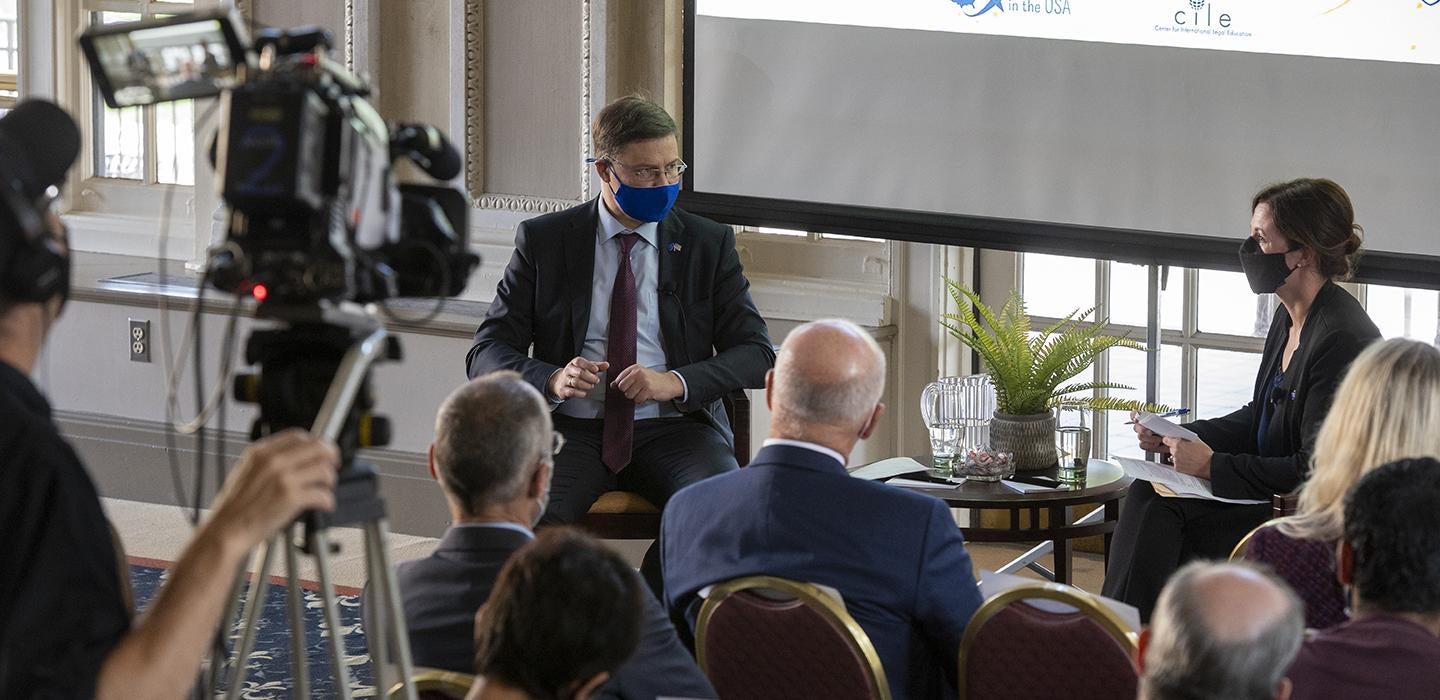
Subscribe to Pittwire Today
Get the most interesting and important stories from the University of Pittsburgh.Pitt’s students and faculty work on issues of policy and trade that span the globe — but sometimes, the international world comes to campus. On Sept. 30, European Commission Executive Vice President Valdis Dombrovskis sat down in the William Pitt Union with Graduate School of Public and International Affairs Associate Dean Erica Owen in a wide-ranging conversation about trade, technology and the relationship between the U.S. and EU.
“I think it was a great opportunity for students to engage with someone in such a senior position who is dealing with these really tough and complex policy issues,” Owen said. “These are issues that really affect students, and there was lots of ground to cover.”
The commissioner, one of the top officials in the EU’s legislative branch, had just the day before met with U.S. Secretary of State Antony Blinken and Secretary of Commerce Gina Raimondo as part of the first meeting of the EU-U.S. Technology and Trade Council in Pittsburgh. (In case you missed it: Read about Blinken’s visit to Pitt.)
Pitt’s European Studies Center sponsored the discussion, which was held in front of an audience of students, faculty members and even the EU ambassador to the U.S., Stavros Lambrinidis. The pair touched on a variety of topics, spanning global supply-chain issues, sustainability and the planning of the next meeting of the council next spring in Europe.
The executive vice president also addressed the needs of workers as the EU transitions to a greener economy, an issue that connects Pittsburgh’s industrial history and economic transition to Dombrovskis’s role: His full title in the European Commission is Executive Vice President of an Economy that Works for People.
“Pittsburgh is a city and region that has experienced the highs and lows of globalization and technological change,” Owen said. The event, she added, was an opportunity to “think about how we’re going to make globalization and technological change work for all people.”
Although Dombrovskis acknowledged some differences in views between the U.S. and EU — citing internet privacy and data concerns as an example — he also stressed that the simple fact that the two economic powers are engaging on thorny issues is a positive one.
“It’s still useful that we are talking, that we are understanding each other better, and possibly are able to address those differences,” Dombrovskis said. “This is a new step which we are making forward in terms of our cooperation.”
Several students in the audience then asked Dombrovskis questions, including first-year political science major Liam Horan, who took the chance to ask Dombrovskis about human rights and the EU’s stance on Russia. “It’s great to hear from such a distinguished guest,” Horan said after the event. “He talked a lot about issues that are relevant to us, but also issues that are really important for Europe.”
Possibly the most relevant issue for students came when Dombrovskis was asked to address them directly, giving students a word of advice for preparing for the 21st century economy.
“I think one thing which is clearly coming is rapid technological development. So in Europe, we are talking about green and digital transformation,” he said. “For the next decade, a big topic will be how we are properly managing this green and digital transformation, how we are moving to carbon neutrality, how we are addressing these different aspects of digitalization.”
— Patrick Monahan


